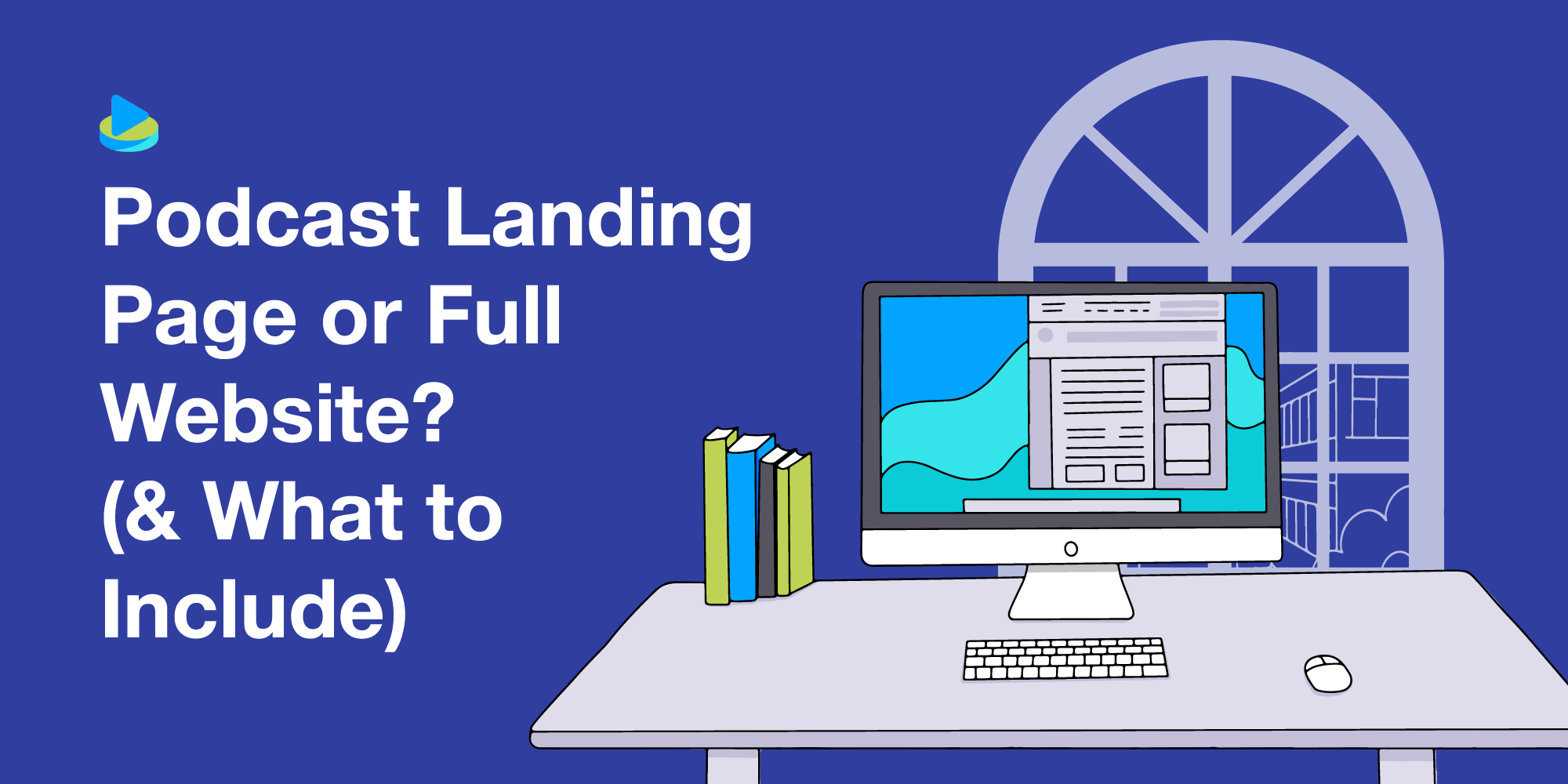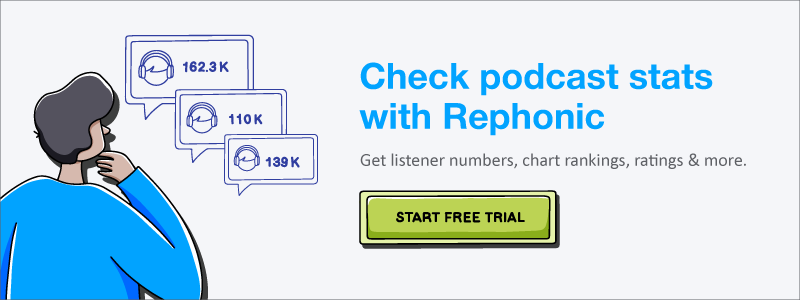Congratulations! You've launched a podcast. That's a tremendous achievement so take a moment to let it sink in.
Unfortunately, listeners won't find you on their own, so it's time to work on your podcast marketing plan, especially your online presence.
Even the podcast directories acknowledge how vital podcast websites are. Apple Podcasts now displays your podcast website or landing page URL so that people have an easy way to get in touch with you - a necessity under EU regulations.
But do you need a podcast website? Or will a landing page be enough?
You may even be wondering what the difference is. I looked it up for you. According to WP Beginner, "a landing page is a stand-alone web page designed for a specific purpose and goal." In contrast, a website "can have multiple pages of information with different goals and purposes."
With that knowledge under our belts let's work out which option your podcast needs.
Table of Contents
Why do you need an online destination for your podcast?
Almost everyone checks everything online as a matter of course. You'll leave potential money on the table if people can't find your podcast. So, even if you're listed on all the directories, your podcast still needs an online home to:
Attract guests
Thought leaders, authors, brands, other podcasters, teachers, marketers, and people with a cause or message are all searching for the right podcast to pitch themselves or their clients as potential guests. Many will find you on Rephonic. Others may take the long way around, trawling through the directories and search engines. Almost all will check out your website as part of their research.
Attract sponsors
Potential sponsors will go the same route when they research your podcast. Whether you've approached them or they want to present you with a proposal, they'll expect to see your podcast information online.
Get found by new listeners
Your guests will share their podcast episodes with their audiences, and some of those listeners will be intrigued and want to hear more of your podcast. They may search through Apple Podcasts or simply Google to find your website.
Enhance SEO with backlinks
Backlinks play a vital part in SEO optimization, keeping your website high in the search rankings so visitors can find it easily. Check out our helpful backlinks article here.
Best options for independent podcasters
There's no question mark here. If you're launching an independent podcast (i.e., not marketing an existing brand), you'll need a complete podcast website.
A website gives you all the pages and links you need as a beginner, plus it allows a lot of scope for when you grow. Perhaps you'll want to add a donate button, a merch shop or sell online courses once you've gained a following.
Establishing your website early gives you a head start in building authority with the search engines when you're ready to start monetizing.
Great podcast website examples:
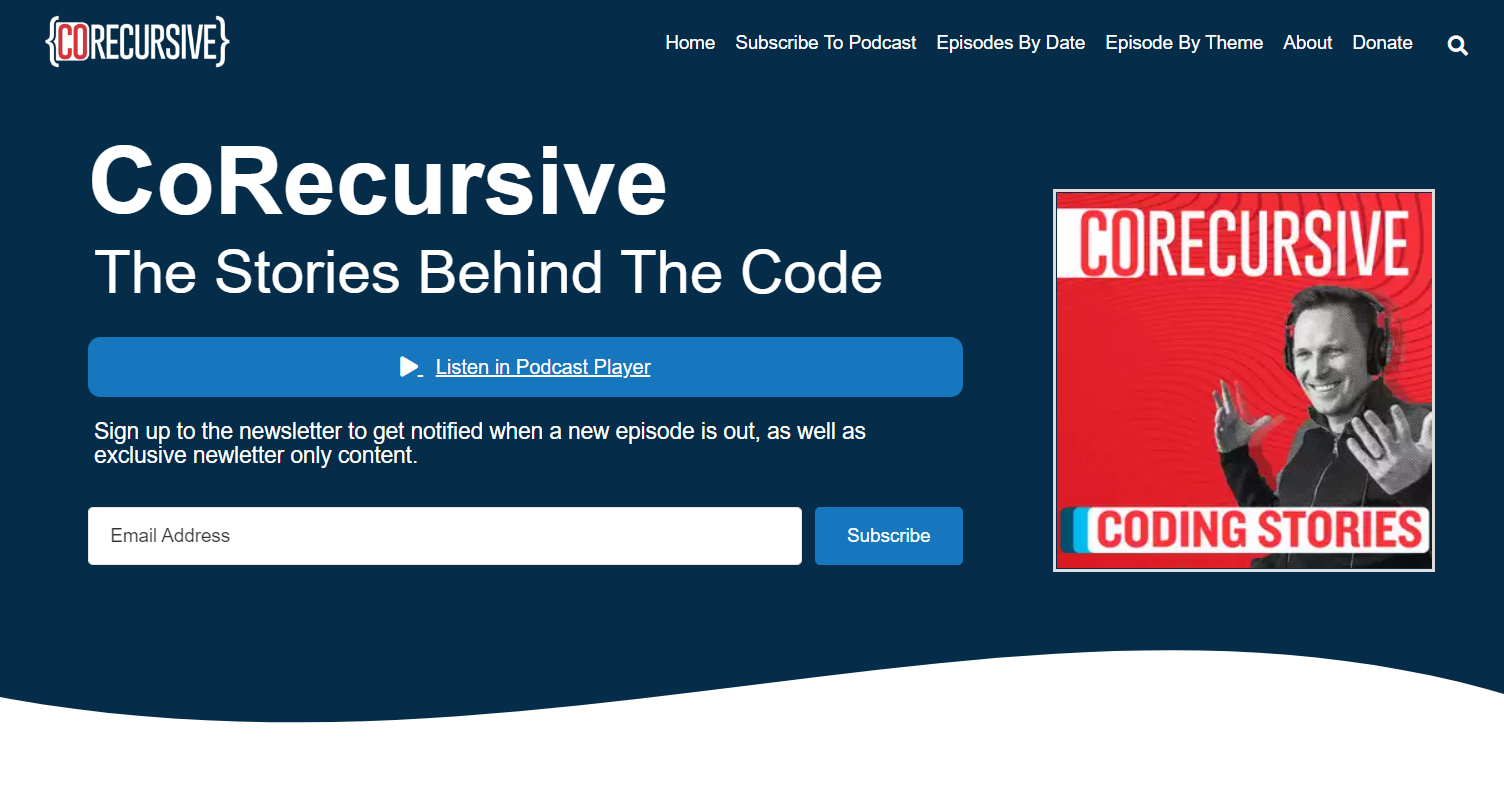
CoRecursive's podcast website design is uncluttered and easy to read, and the podcast artwork stands out. It includes subscribe links and three ways to access episodes. The newsletter CTA is above the fold (you can see it without scrolling) - great for keeping in touch with subscribers, signaling new episodes and marketing. Look top right, and you'll see the donate button gives fans an easy way to support the show.
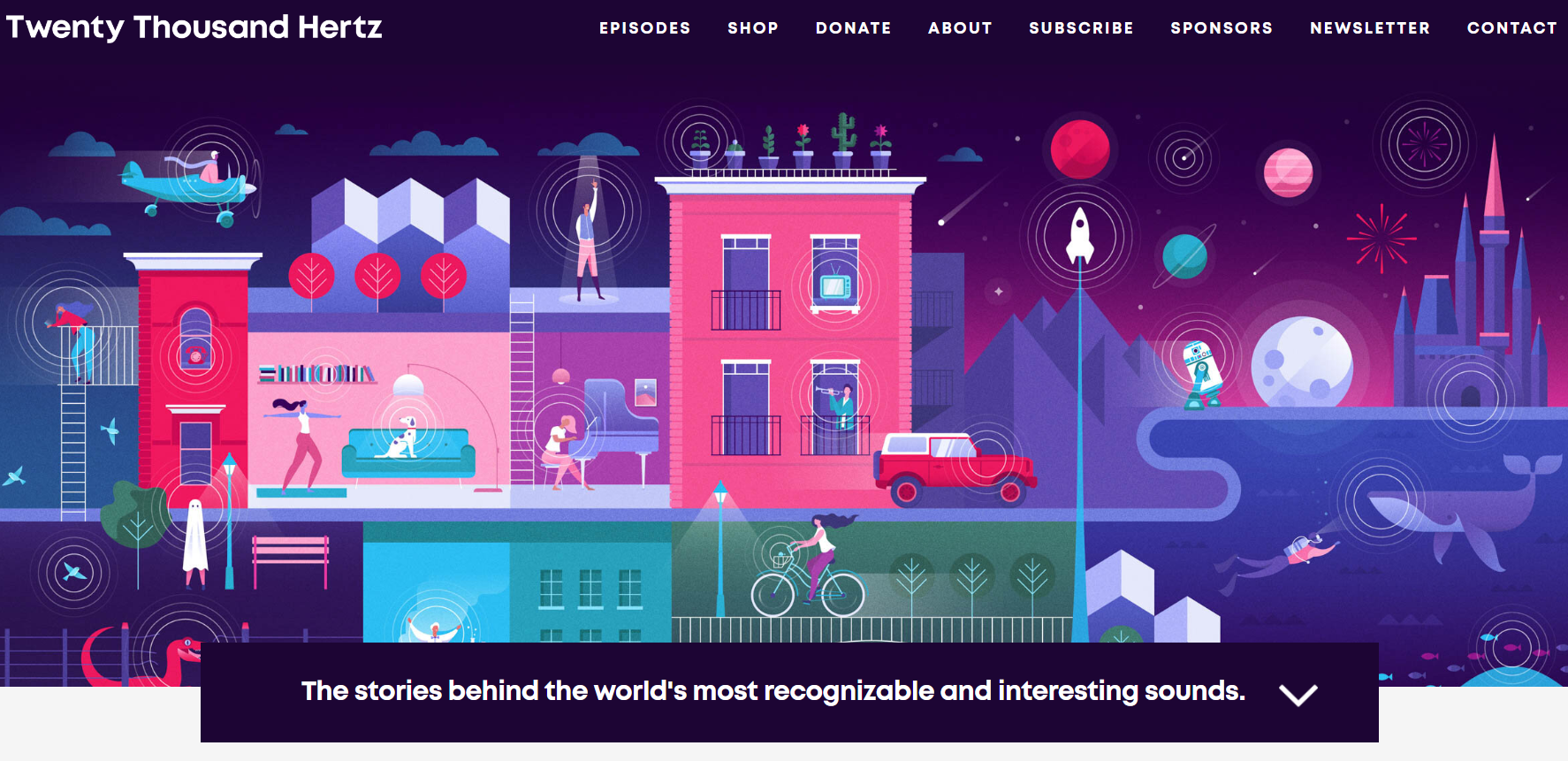
The Twenty Thousand Hertz website doesn't need many words. The artwork gives visitors an immediate sense of what the podcast's about. At the same time, it has all the necessary links at the top, including a shop button and a link to the sponsors.
Best options for brands and businesses
If you're launching a podcast as a marketing tool or extra income stream for an existing brand or business, your website decision isn't quite so clear-cut. Let's examine your options.
Create a new website dedicated to the podcast
As we've mentioned above, you can make an entirely new website with a URL of podcastname.com.
Cons - It could take more time to build up the domain authority sponsors and guests could be looking for.
Verdict - Don't use a different website if your podcast is a marketing tool for your existing brand. However, it might be a good idea if your podcast is a separate entity.
Dedicated podcast website example:
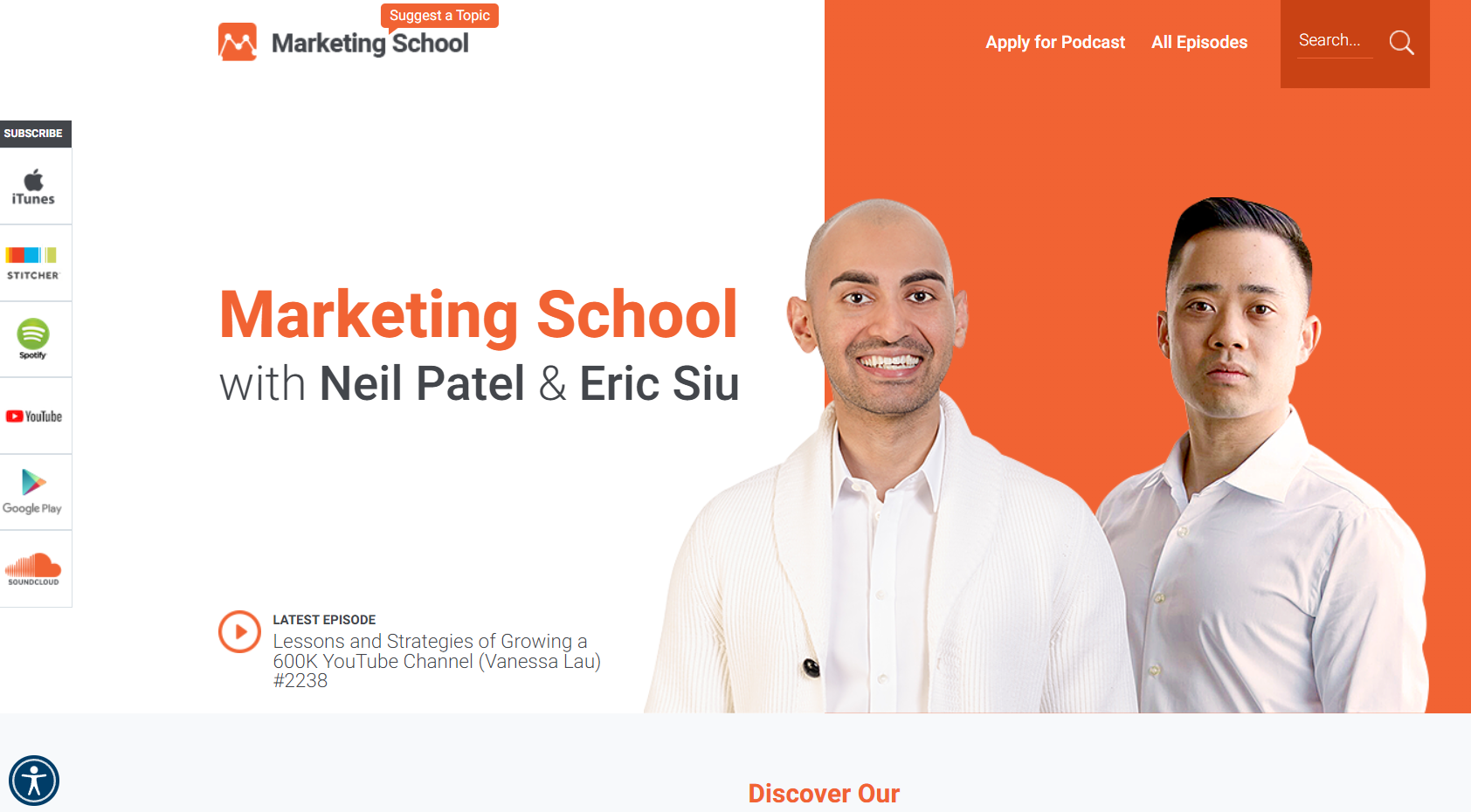
Neil Patel and Eric Siu have separate marketing businesses, so creating an entirely different website for the Marketing School podcast they host together makes sense. The homepage depicts the two hosts, whose action priorities are clearly above the fold. Notice how this website emphasizes listening options (including YouTube) with sticky subscribe buttons down the left side.
Making a website isn't as difficult as you may think. You could use your podcast hosting platform's built-in website builder. Other options include using a content management system like WordPress or an alternative website builder like Squarespace. Whichever option you choose, use an intuitive design to ensure the best possible visitor experience. (In other words, make your site navigation simple and fast.)
Use a subdomain
Your website is your domain and has subdomains or subfolders within it. Subdomain URLs for podcast websites are podcast.domain.com. E.g., in thedistance.basecamp.com, the podcast name is The Distance, and the domain it nests under is basecamp.com.
Cons - Google sees the subdomain as distinct from your domain, so your podcast content and backlinks won't boost the SEO of the primary site. Again, building up the domain authority that sponsors and guests ideally want takes time.
Verdict - Use this option when your podcast has a separate identity but is still linked to an existing brand.
Subdomain podcast page example:
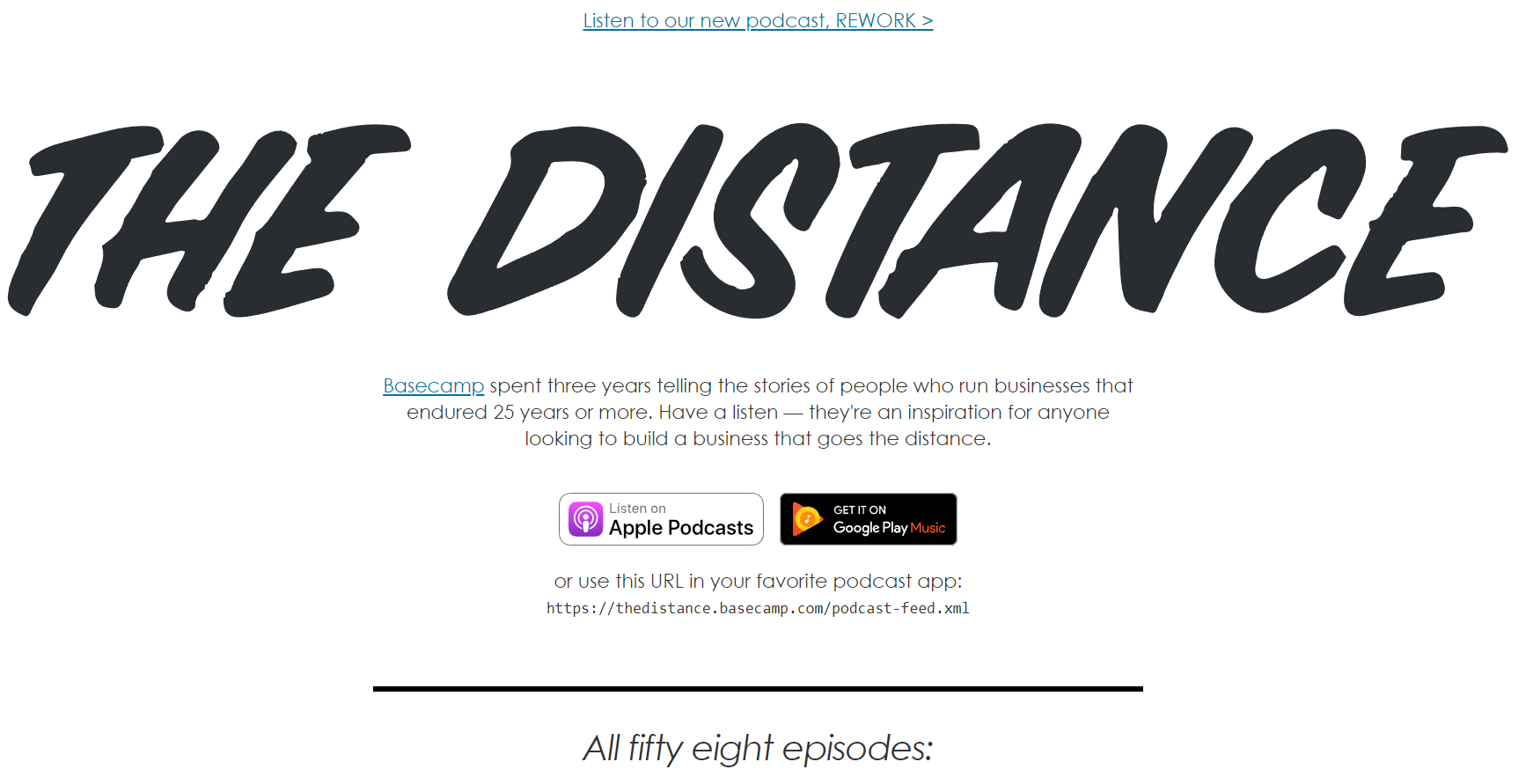
The Distance subdomain page is uncluttered. The title stands out, and there's a short description with a link to Basecamp's homepage and subscribe options. The Distance was a limited-edition podcast with 58 episodes, all linked below the fold.
Create a dedicated landing page or subdirectory on your company website
Podcasts make landing pages or subdirectories on their brand's website when the podcast is part of or related to the brand.
A subdirectory is a folder or pathway within another folder on the website. A subdirectory URL has the root domain followed by the subdirectory, e.g., domain.com/podcast.
Cons - The podcast may appear less significant - just another one of the things to find on this website.
Verdict - Use when a podcast is a marketing tool for your brand or you are looking for guests or sponsors immediately.
Podcast landing page examples:
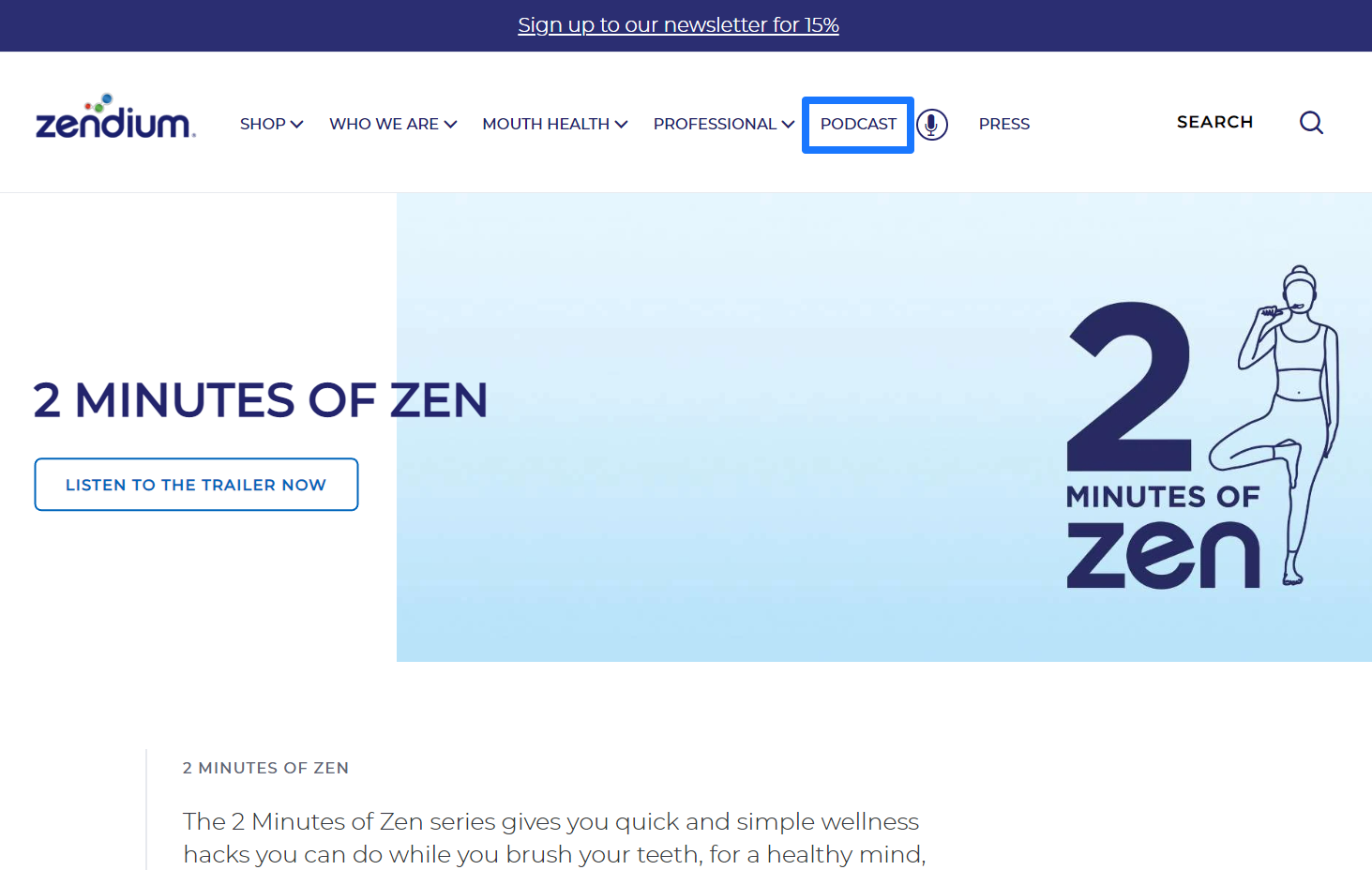
Clicking on PODCAST brings up the above page at zendium.co.uk/podcast
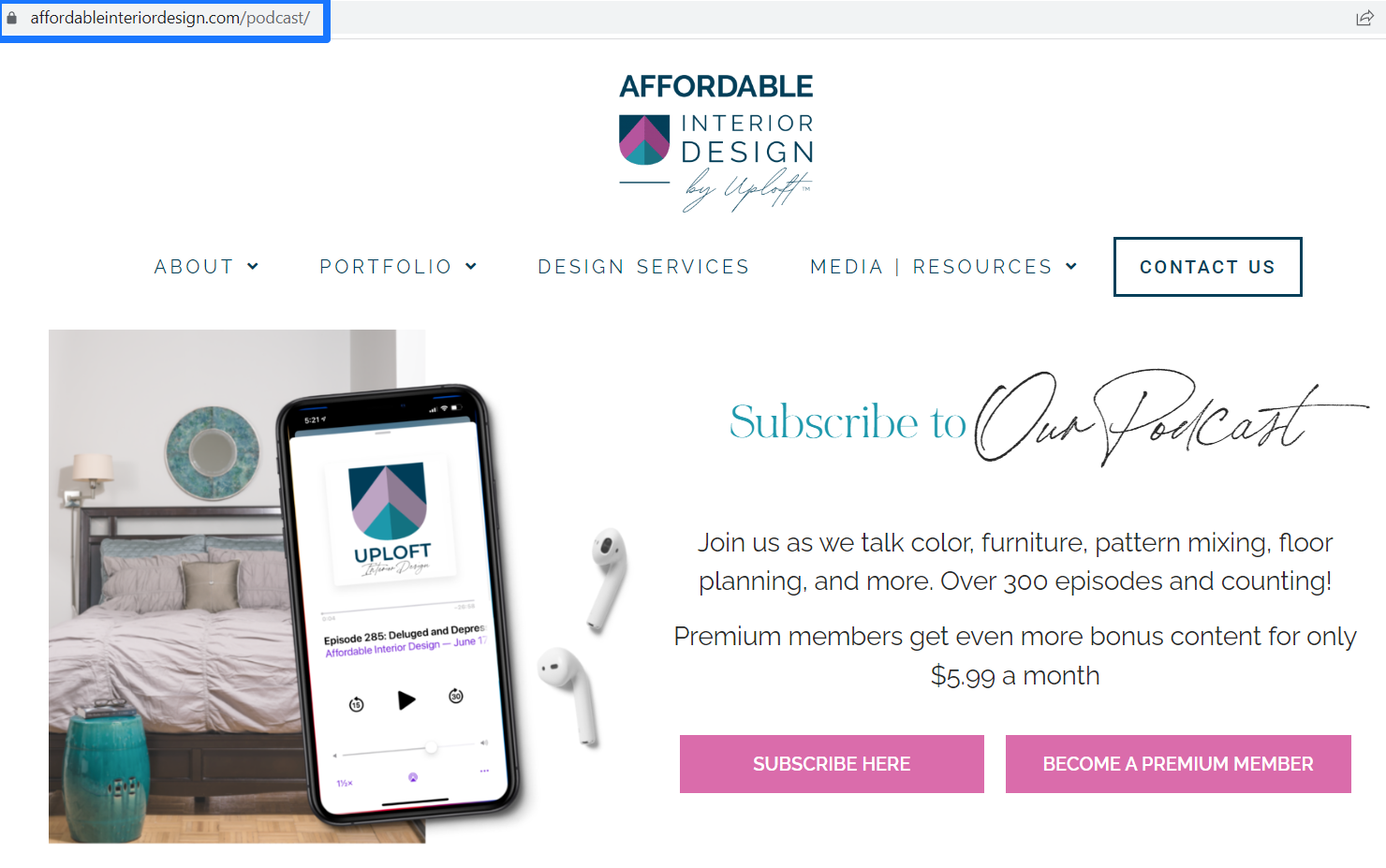
The Affordable Interior Design landing page has topic-related images and clear CTAs to subscribe or become a premium member.
What to put on your podcast website or landing page
Now you've decided between creating a separate podcast website, a subdomain or a landing page, what info and link buttons do your potential guests, sponsors and listeners expect to see? And what do you need to get the maximum benefit from your SEO?
Use a clean design and get inspiration for the color scheme from your podcast cover art.
Essential info to add (with examples)
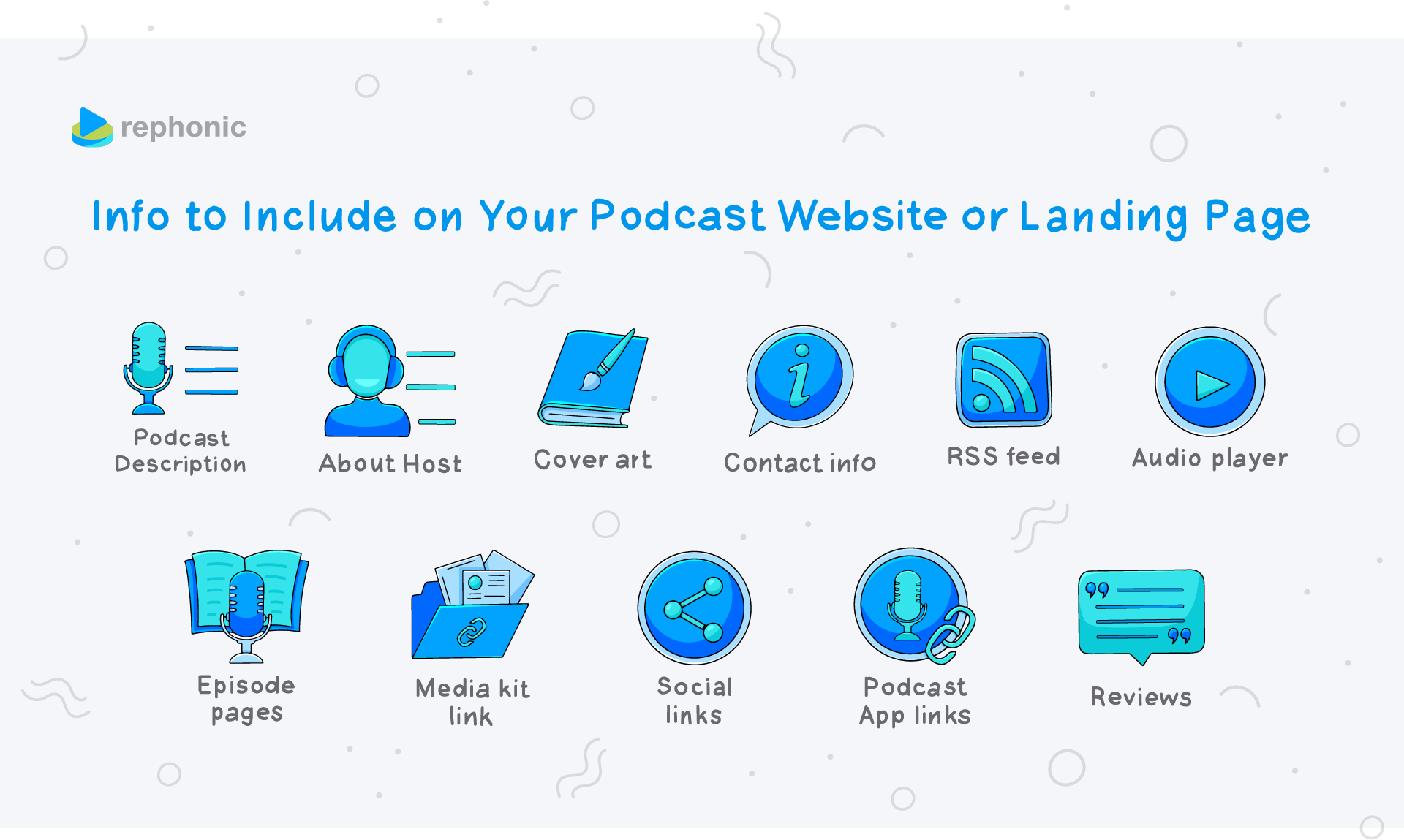
Podcast description - Listeners want to know your show's premise, so a podcast summary is a must. Some podcast websites have their description right on the homepage. Other podcasts prefer to include an ABOUT button in the navigation bar. A potential guest or sponsor will use this summary to decide whether to research the podcast or cross it off their list. It's also a perfect place to include keywords for that all-important SEO.

About the podcast host - Who are you? Why are you hosting this particular podcast? Again, look for keyword opportunities, and write fascinating copy to capture people's interest and imagination.
Cover art - Definitely include your podcast cover art and consider the impact of your overall color scheme. Many of us are visual creatures and often spot the art before we recognize the name. As James Cridland says in our Make Your Podcast Go Viral article,
"Create distinctive artwork for your podcast and use it everywhere. Be consistent so that people can spot your podcast by the logo as easily as they read the name."
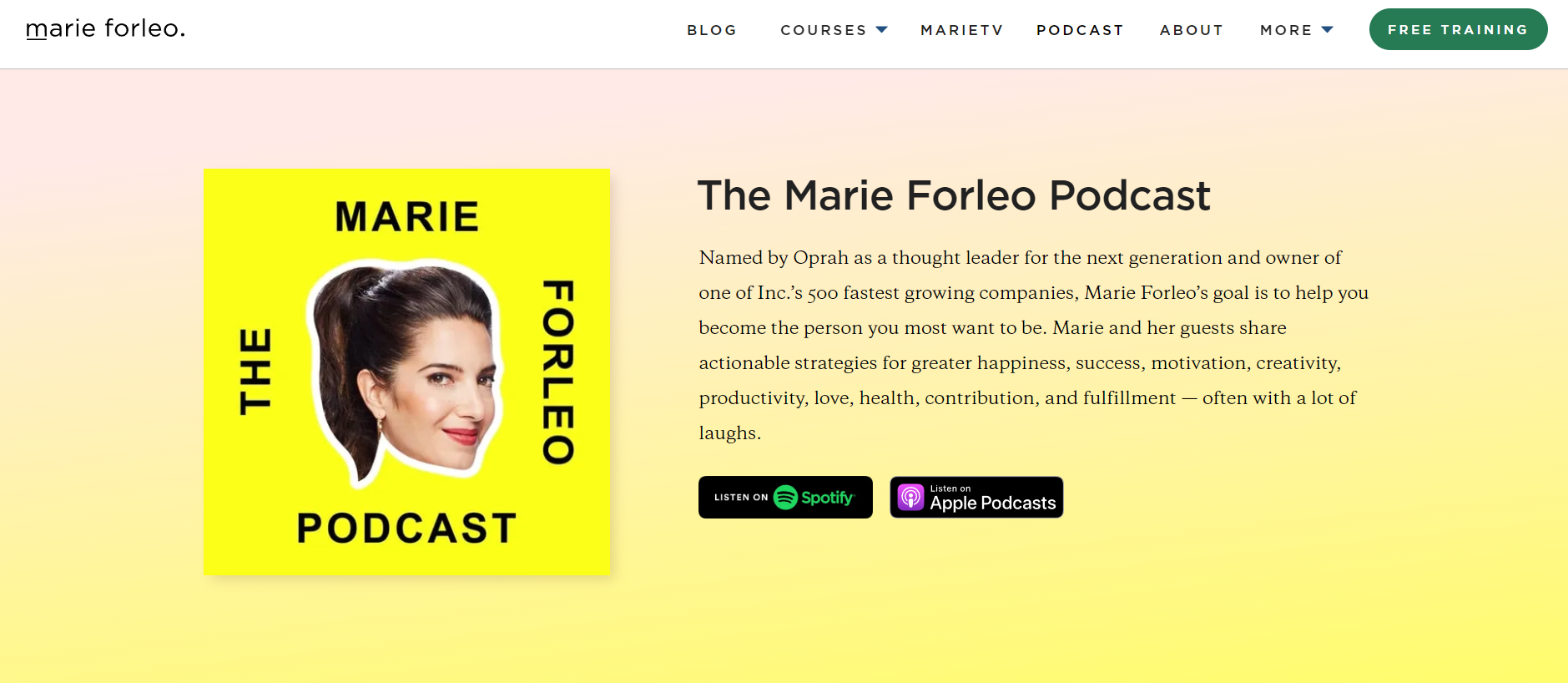
Contact info - You want to make it easy for visitors to reach out to you, so don't hide your podcast email in a dark corner. You often find contact details on the top right side of the homepage and repeated in the website footer.
Podcast RSS feed and social links- Make it easy for website visitors to find out more by including links to your RSS feed, social sites and other podcast directories. Sometimes the links are in separate places, but you'll often see the podcast RSS feed alongside the social links.
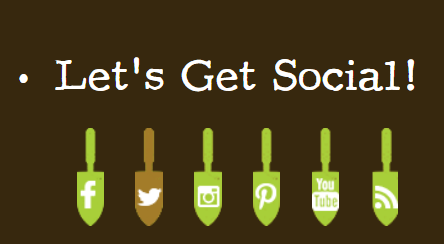
Audio player - Include an audio player on the page so people can quickly check out your latest episodes.
Episode pages - Make it easy for guests and sponsors to research past episodes by including episode links on your site and make them attractive by using the episode artwork. Include the show notes to entice listeners. Including episodes makes it more straightforward for writers and other podcasters to create backlinks to your podcast website when they want to quote your work. For example, you won't get any SEO benefit if they link to Apple Podcasts.
Some podcast websites include featured episodes to give visitors inspiration or education on what the podcast has to offer or boost the listener numbers on your best episodes.
Subscribe links on podcast apps - Have a standout subscribe button.
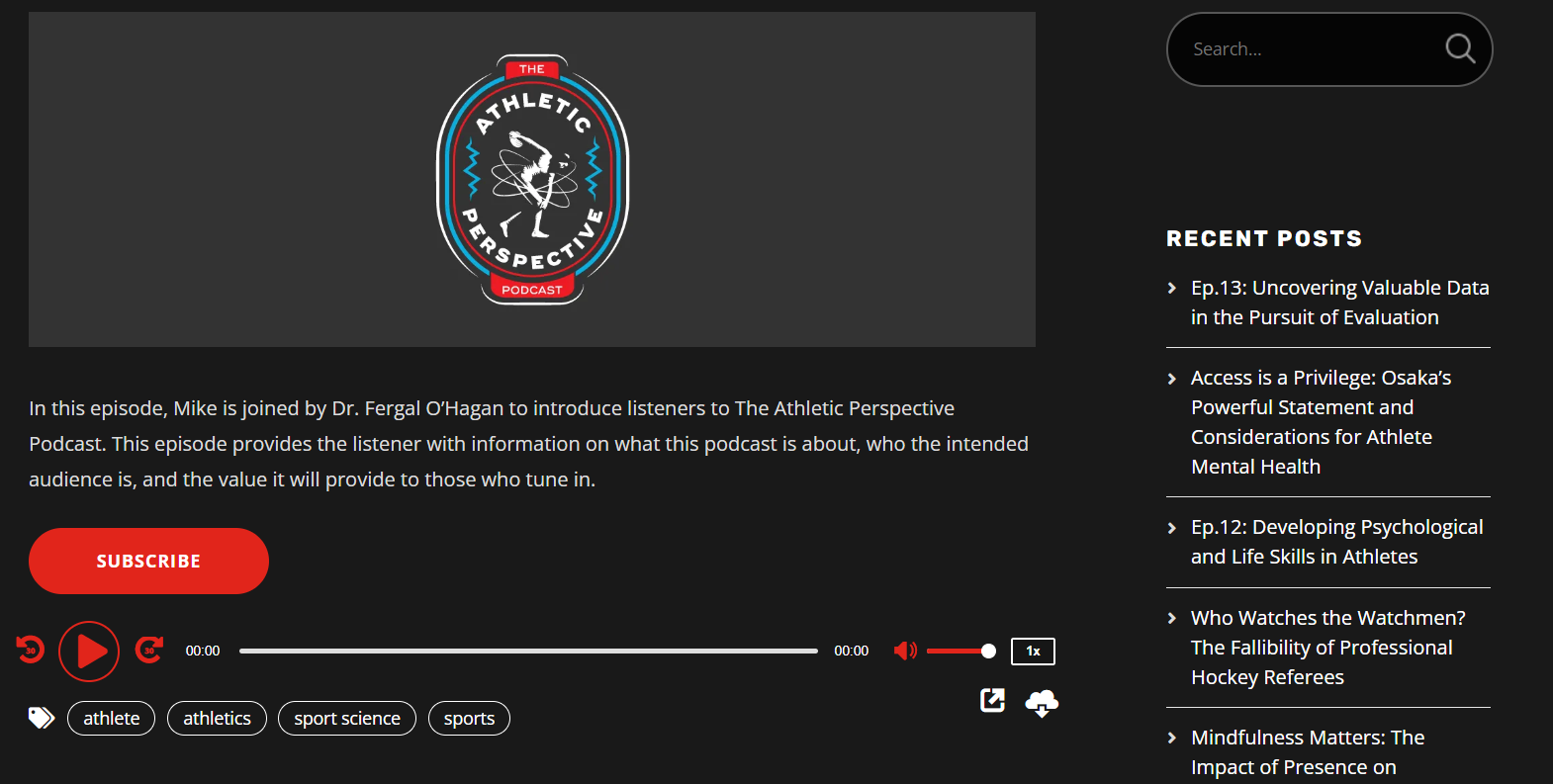
Podcast media kit - An informative media kit contains all the essential information, such as podcast listener numbers, contact details, podcast ratings, sponsorship details etc., in one easy-to-access page. It can be a webpage or a printable PDF and is essential if you want to attract guests, sponsors or media opportunities.
Fantastic reviews and ratings - 5-star podcast reviews make excellent social proof, so include them on your website. Head to your Rephonic podcast page to easily find your latest reviews and ratings across multiple apps.
Highly recommended additions
Email subscriber button - Emails are still one of the most effective (and cheapest) communication tools. If you intend to monetize your podcast at some stage, then sending a relevant newsletter and engaging podcast emails is marketing 101.
Share links - Is it easy for people to share your podcast on social media and other platforms? Include the link buttons on your podcast website.
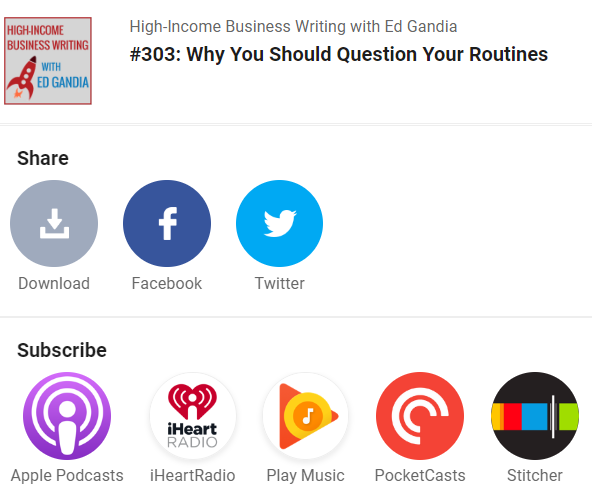
Blog - Many podcast websites include a blog section. Some repurpose their episodes by writing an article based on that topic. Other blogs include transcripts of their episodes. As well as giving fans another way to consume your content, blogs are an excellent way to include keywords and links on your site - terrific for SEO. Some websites call their blog section 'News' and include articles about the podcast or host from guests and other sources, as well as their blog posts.

Support CTA - Being a podcast host takes time and money. Include links to donation sites like Patreon or Buy Me A Coffee to give visitors a way to support your work.
Listener numbers - You know how many listeners your podcast has, but does anyone else? If the numbers are good, it's worth sharing them on your website.
Chart rankings - if you have great podcast rankings, why not advertise that on your website.
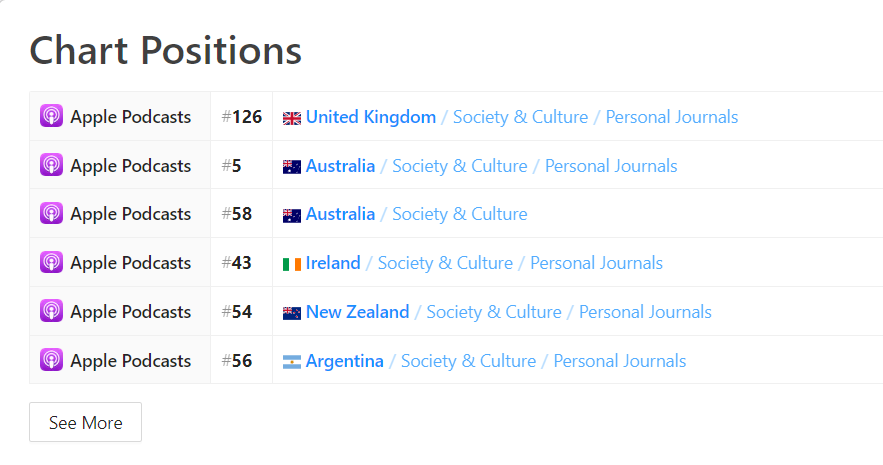
Conclusion
The best podcast website examples have all the features any listener, potential sponsor, or guest would want to find. They are easy to navigate, and their design goes hand in hand with their brand.
Your website or landing page is a crucial player in your podcast marketing strategy. So, now that you're clear on what to build, what are you waiting for?
It's time to gather your ideas and start building your best podcast website today.
P.S. It won't be long before you're thinking about cross promoting your podcast and giving guest interviews on other shows. Sign up for a free trial with Rephonic to discover and connect with your perfect podcast matches.

